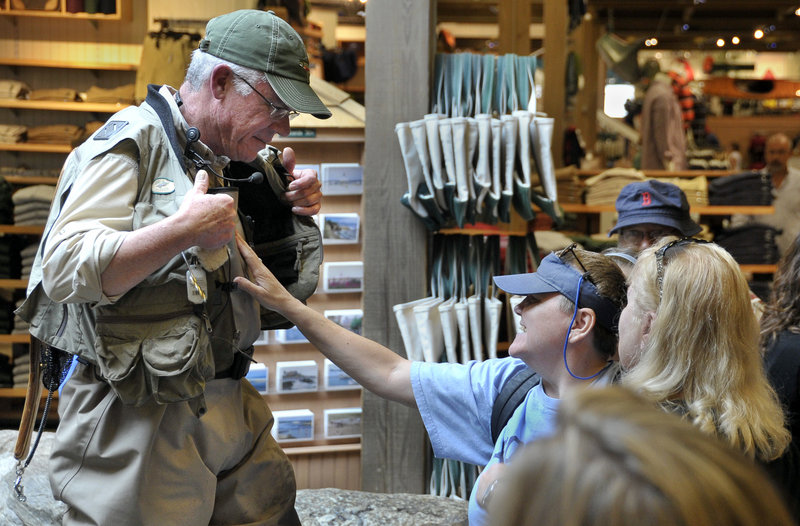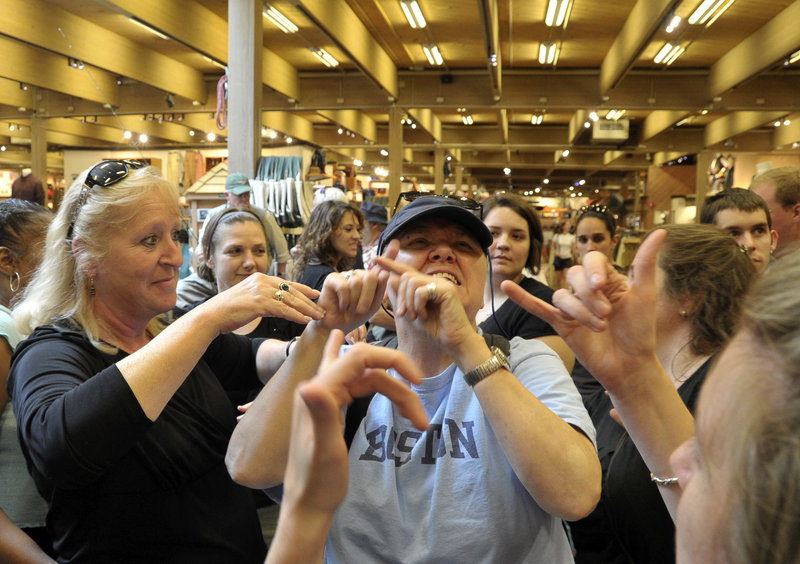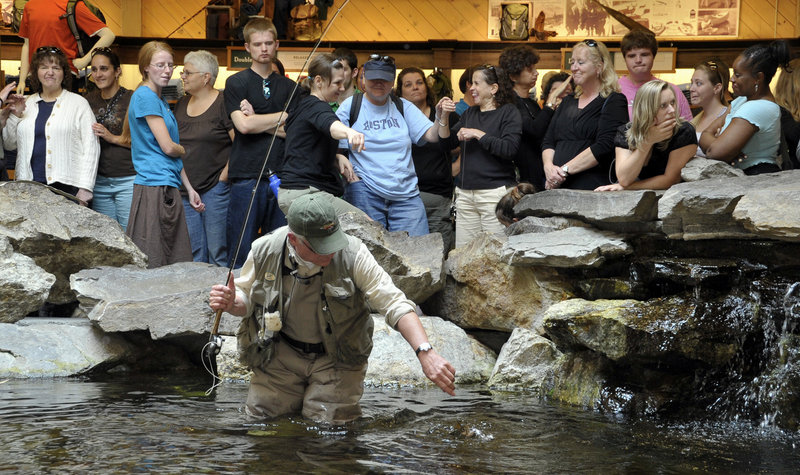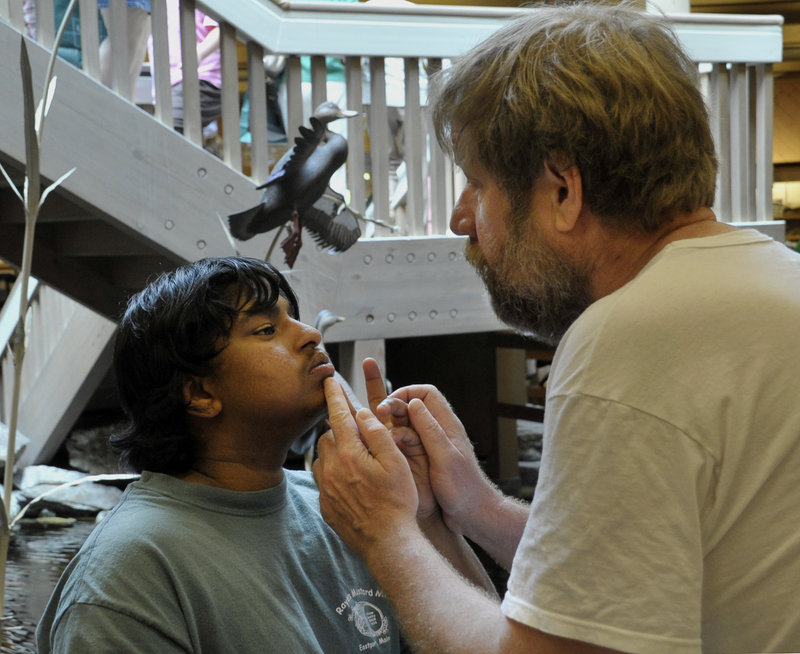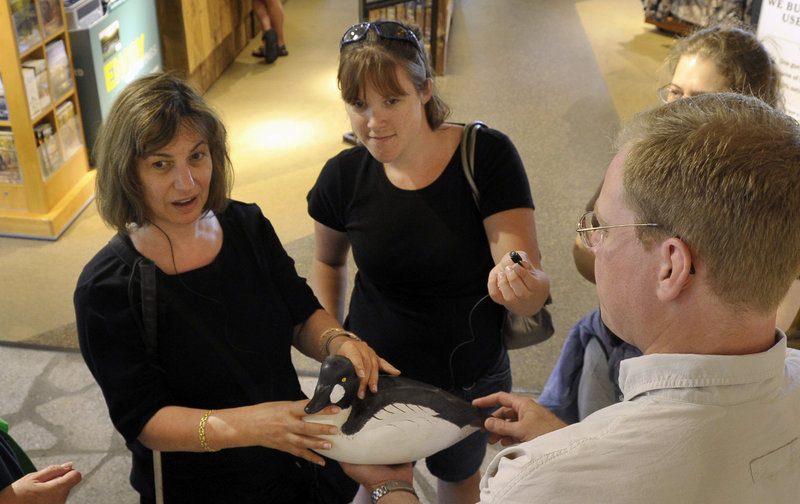FREEPORT – The blindfold put Maggie Hoyt in a place she’d never been, walking through L.L. Bean, led by several American Sign Language interpreters who took turns describing their surroundings into the palm of her hand.
Hoyt, who is deaf, learned Thursday just how much she depends on her sight. She also learned how challenging it must be for people who are both deaf and blind to be wholly dependent on others to connect with the world.
“You have to learn to trust people. That’s a big thing,” Hoyt said later through an interpreter. “If I couldn’t see, I’d have to trust people in a way that I never had to before. Trust them to help me pick out the shoes I like, to make sure my hat matches my coat. All of these little things become really important.”
Hoyt, 19, is participating in a first-time training program for 56 students learning to provide interpreting and support services for Mainers who are both deaf and blind. She’s home in Edgecomb on summer break from Gallaudet University in Washington, D.C., where she’s studying physical education and personal training.
More than 80 people are involved in the weeklong immersion course, offered through the University of Southern Maine and sponsored by the Maine Department of Labor.
They include several instructors from the Helen Keller National Center in Sands Point, N.Y., and several volunteer clients who have varying degrees of hearing and sight impairment.
Such training opportunities are rare in the United States and have never been available in Maine, said Judy Shepard-Kegl, a linguistics professor at USM.
As a result, Maine has inadequate interpreting and support services for people who are deaf and blind, Shepard-Kegl said. Mainers who have both disabilities often move to states where programs are readily available or live very limited lives here. Shepard-Kegl said she knows of more than 20 people in each of those situations.
The immersion course, which will include a scavenger hunt today on Mackworth Island in Falmouth, was developed by members of the deaf and blind communities, the educational system and state government.
“It’s all of us working together to make Maine deaf-blind friendly and accessible,” Shepard-Kegl said.
On Thursday, students worked with deaf and blind volunteers in various situations throughout the L.L. Bean store.
They shopped, examined taxidermied animals in the hunting department, and witnessed a catch-and-release fly-fishing demonstration at Bean’s indoor trout pond.
“I knew I was going to be presenting to this group ahead of time, so I really thought about what I would say,” said Ken Estes, a sales representative in the fishing department.
“I also tried to speak slowly because I was aware that people were learning sign language.”
The students helped the volunteers navigate ramps and stairs and accommodated their canes and guide dogs.
They were expected to interpret everything they heard and translate everything they saw as completely as possible, from the shape of cathedral windows and the color of clothing displays to the texture of granite floor tiles and the structure of a metal bird mobile.
One of the students is Corrine Couturier, 25, of Waterboro, who graduated from the linguistics program at USM.
She works at a group home in Portland for developmentally delayed adults who are deaf. Some of their friends are blind.
“I want to be a more well-rounded interpreter,” Couturier said. “Before I took this course, I thought it might be a lot more difficult to communicate with people who are both deaf and blind. But after the first day, I was totally fascinated by the challenge of it. I just want to keep learning.”
Patty Sarchi is a deaf and blind person who urged state labor officials to sponsor this week’s training program.
The 63-year-old Portland woman knows the terror of walking on uneven streets and sidewalks with her trusted black guide dog, Othello, worrying all the while that a distracted driver or a herd of pedestrians might mow her down.
She hopes to have regular access one day to interpreters and support service providers who understand both of her disabilities.
“It’s important to have the freedom to go where you want to go,” Sarchi said. “To be able to live in the open world and not be in fear.”
Staff Writer Kelley Bouchard can be contacted at 791-6328 or at:
kbouchard@pressherald.com
Send questions/comments to the editors.

